| Health
Service Group Conference 23-25 April 2012
These reports are from a Scotland perspective and where Scotland
delegates were particularly involved. For other reports see the
UK
pages
How you do partnership working working - not
from weakness, but from strength
We do not get these agreements because the employers or the
government are good guys. We get these agreements in Scotland
because of our strength. The employers and the government know
just how strong we are, Gordon McKay tells Conference.
Campaign for 'evidenced' nurse-patient ratios
“Our international sister unions in Australia and the
United States have already achieved mandatory staffing ratios.
These regulations have shown that smaller workloads for nurses
are significantly related to lower patient mortality", Scottish
SGE member Alex Joyce told delegates.
Let's get organised!
Conference backed a Scottish Health Committee call to put
more resources into organising members, building on the November
30 pensions campaign lessons.
Tackling the impact of an ageing workforce
on Allied Health Professionals
With the retirement age increasing, Allied Health Professionals
(AHPs) are concerned about the impact of the ageing workforce
on their health, patient care and the career progression of newly
qualified staff.
Our union is the foundation on which we
will build resistance - Prentis
“What do we get from this coalition? No hope, no vision,
no jobs, no growth. The life squeezed out of our economy to pay
for the failure of the banks"
How you do partnership working working - not from weakness,
but from strength
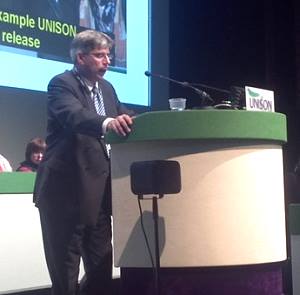 |
| Gordon McKay |
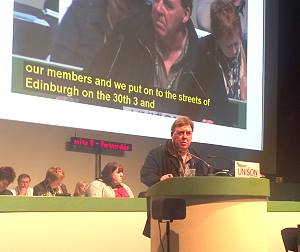 |
Mick McGahey, Lothian Health, also joined
the debate |
“Partnership working has delivered for our members in Scotland.
It has a delivered a no-compulsory redundancy agreement, it has
delivered a lifetime organisational change pay protection agreement
including pay awards and enhancements and unsocial hours",
Gordon McKay, Scottish regional delegate, told the Health Conference.
“But let’s be honest, we do not get these agreements
because the employers or the government are good guys. We get
these agreements in Scotland because of our strength. The employers
and the government know just how strong we are.
"UNISON ran the Health Service in Scotland on November 30th.
We closed every service that we chosee to, and every service that
ran, ran because UNISON agreed exemptions.
“Conference, that is how you do partnership working - not
from weakness, but from strength.”
Conference agreed to:
1) continue to embed partnership working at national, regional
and local level;
2) uphold the NHS Constitution (England) and ensure its application
during
this period of change and into the future;
3) develop human resources frameworks and policies that maximise
job
security and avoid compulsory redundancies;
4) ensure successor Regional Social Partnership arrangements are
put in
place following the abolition of SHAs in England;
5) defend and extend trade union facility time to undertake partnership
working.
top
Campaign for 'evidenced' nurse-patient ratios
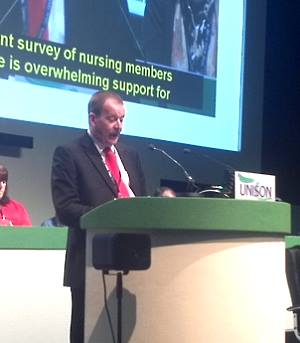 |
| Alex Joyce |
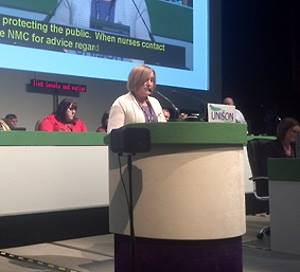 |
|
Margo Cranmer |
“Our international sister unions in Australia and the United
States have already achieved mandatory staffing ratios. These
regulations have shown that smaller workloads for nurses are significantly
related to lower patient mortality", Scottish SGE member
Alex Joyce told delegates as Conference called for a broad coalition
across patient groups and voluntary organisations for 'evidenced'
ratios.
Lanarkshire Health Branch's Margo Cranmer said that her barnch
had seen an increase in the number of referrals to the NMS regarding
firness to practice either due to poor care or poor documentation.
"We are finding that in many of these cases that poor staffing
levels of a dilute skills mix has been a contributory factor",
she told Conference.
“The NMC code has an opening statement which is and I quote,
‘We exist to safeguard the health and wellbeing of the public’.
Simply holding a register is not sufficient to fulfil their role
of protecting the public. When nurses contact the NMC for advice
regarding low staffing levels or are the subject of an NMC investigation,
the NMC do not investigate employers, therefore the NMC are failing
to protect the public and nurses registrations are being compromised.
“The NMC do not consider the role of the employers or levels
of staff.”
Conference voted on a plan of action to include:-
1) Developing a campaign to introduce evidence based nurse-patient
ratios
within the NHS.
2) Building a coalition of support across all interested parties
including patient
groups, community and voluntary organisations.
3) Working with the Nursing Sector to produce a wide range of
materials for use
by regions and branches to inform members and the public of the
need for
nurse-patient ratios within the NHS.
4) Identifying regional and branch leads in order to develop,
organise and
promote the campaign at a local level.
5) Working with Labour Link and all other sympathetic MPs producing
briefings
on our proposals, clearly explaining our rationale and the benefits
to staff,
patients and the NHS.
top
Let's get organised!
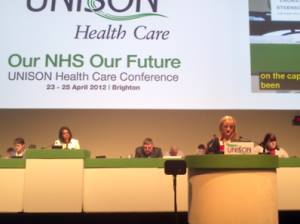 |
| Wilma Brown |
Conference backed a Scottish Health Committee call to put more
resources into organising members, building on the November 30
pensions campaign lessons.
Wilma Brown, speaking on behalf of the SGE, said: “We must
move away from the usual reactive fire fighting methods that we
all dislike to more pro-active, ready for action methods.
"We must maximise our ability to engage with members, employers
and the wider community around our campaigns. There is no doubt
that a well organised Ward or Department will provide the members
with a better workplace.”
The motion called oon the Health Service group Executive to:
1) Encourage and promote a shift of resources from 'servicing'
activity to
'organising' work;
2) Work with health branches, regions and other relevant departments
to put in
place training and briefing materials on effective organising
methods to
ensure that branches can access as many organising tools as possible;
3) Encourage health branches to develop organising plans as part
of campaign
activity and for regions to organise training events to develop
and promote an
organising culture within health;
4) Encourage the spread of best practice in successful organisation
between
branches.
top
Tackling the impact of an ageing workforce on Allied
Health Professionals
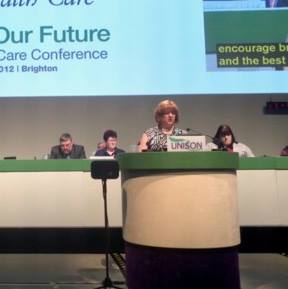 |
| Sandra-Dee Masson |
With the retirement age increasing, Allied Health
Professionals (AHPs) are concerned about the impact of the ageing
workforce on their health, patient care and the career progression
of newly qualified staff.
UNISON Scotland’s Sandra-Dee Masson told the
Conference, “The NHS is not engaging new staff in the younger
age groups. Cuts to service, the reliance on skill mix to redesign
services to cut costs and changes in service delivery mean there
are less vacancies or opportunities available.
“The opportunity to move into less physical
jobs as we near retirement no longer exists due to service cuts
and downbanding of AHP’s posts.
“We must seek to explore options for less
physically demanding roles as the retirement age increases but...
we must safeguard against AHPs being forced to take a cut in hours,
take part-time posts or take early retirement - actions which
affects the pensions our members will receive.
The conference called on the Service Group Executive
to:
1) liaise with relevant bodies such as Partnership for Occupational
Safety and
Health in Healthcare (POSHH - a sub committee of the NHS Staff
Council) to
initiate discussions about the occupational health implications
of an ageing
AHP workforce;
2) ensure that the importance of career planning and career progression
for
therapy staff is highlighted in UNISON’s “Our NHS
Our Future" campaign;
3) work with NHS Employers to explore options for less physically
demanding roles for AHPs having to work longer as the retirement
age increases.
top
Our union is the foundation on which we will build resistance
- Prentis
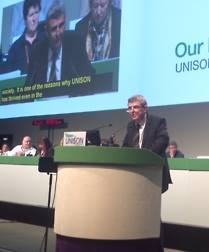 |
| Dave Prentis |
“What do we get from this coalition? No hope, no vision,
no jobs, no growth. The life squeezed out of our economy to pay
for the failure of the banks", Dave Prentis, UNISON General
Secretary told the Health Conference in Brighton.
“And when they need to find more money, where do they look
first? To our members. Need to pay for bankers’ bailouts?
Cut our public services. Want to cut taxes? Come after our pensions.
Economy stagnating? Freeze our pay.
“Two years of cuts, two years of austerity. And this is
just the beginning. The bulk of the coalition cuts are yet to
happen. The true pain is yet to come. We will not allow ourselves
to despair or fall victim to fear. Our union is the foundation
on which we will build resistance.
“We have a message for Andrew Lansley. We will not sit
back and allow Andrew Lansley to destroy our national pay agreement.
If he tries to undermine agenda for change, if he tries to reduce
the pay of our members who live and work in poorer communities,
if the unjust and unfair pay freeze does not end - we will make
our stand. Our stand for what is right, what is just,
“They’ve attacked our pensions and we resisted. If
they come for our pay we will be ready, prepared and if we need
to move to industrial action to protect everything that is right
then we will do it.
“And now a fundamental attack on our national health service
– the Health and Social Care Act. No-one wants it. The people
who work in the NHS, the people who manage the NHS, even the GPs
who are expected to run it. Voters don’t want it, patients
don’t either.
“So who does want this act? The Tories – because
they don’t value the NHS – why would they? They don’t
use it.
“Their friends the privateers want it because they value
the contracts they can win. They value the NHS as a logo they
can stick on their own services, and they value the fat profits
they can wring from a system which was designed to save lives
not make money.
“We fought this bill tooth and nail. But we still remember
that Labour built the bridge that the Tories walked over. And
our fight is not finished. If Labour return to power we will expect
them to repeal the legislation. We will not forgive them if the
Act is not repealed.”
top
|



